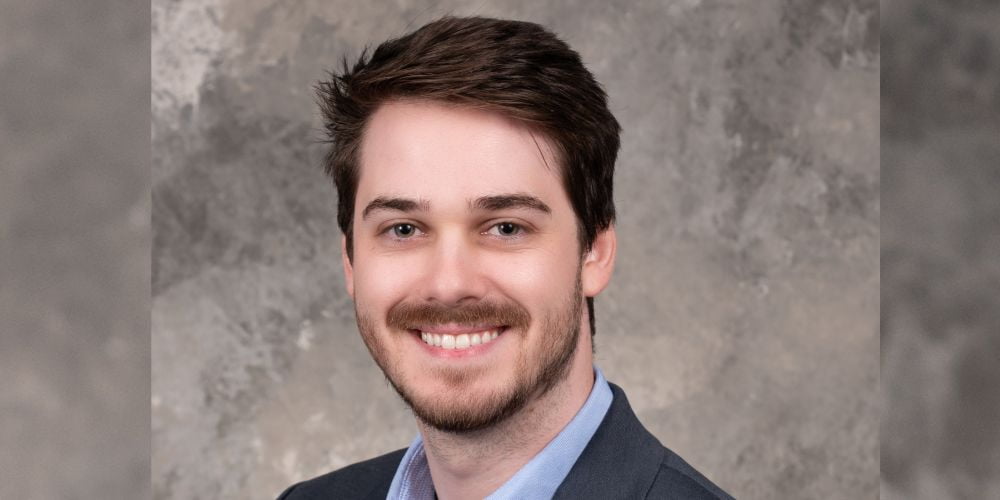
Alec Whited ('25 MS, Biology) is helping uncover how cells remove waste, a process that could lead to better treatments for autoimmune diseases and improved wound healing.
While studying in the Ghose Lab at UT Arlington, Whited identified a previously unknown cellular pathway that improves how organisms remove dying cells. His findings, coauthored with fourth-year UTA doctoral student Aladin Elkhalil, were recently published in Genetics, one of the field's top journals.
"Similar to taking your garbage out on trash day, living things must also get rid of their unwanted waste, whether it's digested food or dead cells that have fulfilled their purpose," said Whited, now a research assistant at UT Southwestern. "This work helps us understand a specific step in the process of clearing those cells that have completed their job and are no longer needed. When this process is interrupted or does not work, it can cause major issues for the organism."
Whited recently shared his thoughts about the study and his time at UTA.
Q: What does it mean to be published in a prestigious journal such as Genetics?
Whited: It's a tremendous honor. Even before my research career truly began, I had heard of this prestigious journal, and to now be part of it feels surreal. It's a recognition not just of my individual work, but of the incredible support I've received from mentors and colleagues. It also reinforces my passion for research and motivates me to continue contributing to the scientific community.
Q: Can you describe why it's important that dying cells are cleared? Is this related to inflammatory diseases?
Whited: Yes, inflammation can be caused by many factors, and one of them is the failure to clear dead cells properly. When cells die, they release molecules that can trigger inflammatory responses. If these dead cells aren't cleared out efficiently, the body may mistakenly interpret these molecules as threats and launch an immune response. This can lead to chronic inflammation and contribute to autoimmune diseases.
Q: How can this study help in wound healing?
Whited: One of the genes we studied has been linked to cell-to-cell fusion, a key process in wound healing. This process helps cells come together to repair tissues and close wounds. By better understanding the genetic mechanisms behind this, we hope to identify additional genes that could play a role in improving wound healing. This could have implications in advancing our knowledge of how we can accelerate wound healing or treat chronic wounds, though much more research is needed to fully understand how.
Q: What message would you give to aspiring scientists about the research being done at UTA?
Whited: While I can't speak for every department at UTA, I can say that the Department of Biology has been incredibly supportive. The faculty and students share genuine excitement for research. There's a collaborative spirit that drives everyone to push the boundaries of what we know. There were four labs in the space that I worked in, and everyone was eager to learn new concepts and apply them to their own research. This mindset fosters not only academic growth, but also a sense of belonging in the broader scientific community. Ultimately, I believe this is the core goal of science: to make meaningful contributions that help us understand the world around us and leave a lasting impact on the field. UTA cultivates that environment, and it's been an exciting place to develop as both a researcher and a future scientist.
This work was supported by The Cancer Prevention Research Institute of Texas (RR100091) and the National Institutes of Health–National Institute of General Medical Sciences (R35GM142489).
About The University of Texas at Arlington (UTA)
Celebrating its 130th anniversary in 2025, The University of Texas at Arlington is a growing public research university in the heart of the thriving Dallas-Fort Worth metroplex. With a student body of over 42,700, UTA is the second-largest institution in the University of Texas System, offering more than 180 undergraduate and graduate degree programs. Recognized as a Carnegie R-1 university, UTA stands among the nation's top 5% of institutions for research activity. UTA and its 280,000 alumni generate an annual economic impact of $28.8 billion for the state. The University has received the Innovation and Economic Prosperity designation from the Association of Public and Land Grant Universities and has earned recognition for its focus on student access and success, considered key drivers to economic growth and social progress for North Texas and beyond.






